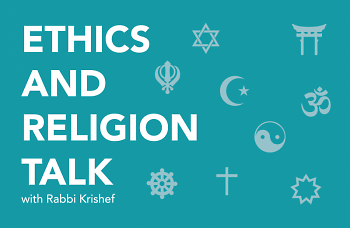Father Kevin Niehoff, O.P., a Dominican priest who serves as Judicial Vicar, Diocese of Grand Rapids, responds:
“Merriam-Webster Online defines monotheism as ‘the doctrine or belief that there is only one God.’ I may get myself in trouble with my colleagues of differing religious traditions. My understanding is the three monotheistic religious traditions are Christianity, Islam, and Judaism. Hinduism worships one God without denying the existence of other gods.
“The Roman Catholic religious tradition defines The Trinity as ‘only one true God, eternal, infinite (immensus) and unchangeable, incomprehensible, almighty, and ineffable, the Father and the Son and the Holy Spirit; three persons indeed, but one essence, substance, or nature entirely simple’ (Catechism of the Catholic Church, p. 55).
“Western Christians, especially, tend to overthink everything. I must remind myself to remain simple with the following summing up my belief. There is but one God, whose essence, substance, and nature are manifest in three persons, the Father, the Son, and the Holy Spirit.”
Fred Stella, the Pracharak (Outreach Minister) for the West Michigan Hindu Temple, responds:
“The Abrahamic are very settled in their conviction that they are monotheistic. As for Hinduism, we don’t easily fit into the compartments offered so easily. For the last century my spiritual forebears were clamoring to their Christian, Jewish and Muslim friends that they were monotheists too. After all, Brahman is one. But over the past couple of decades there has grown a consensus that we need not conform to the theology of others just to please. So, there is now exists a greater pride in discussing the polytheistic elements of Hinduism, as well as the henotheistic shadings of some sects.
“But the scriptures are clear that ultimately, God (Brahman) is all that is. This moves us into monism, which is different from monotheism. ‘That supreme Brahman is infinite, and this conditioned Brahman is infinite. The infinite proceeds from infinite. Then through knowledge, realizing the infinitude of the infinite, it remains as infinite alone.’ (Mundaka Upanishad) Another “ism” that is closer than monotheism is panentheism. This indicates that the Supreme exists as manifested creation, while also existing beyond creation.”
Rev. Ray Lanning, a retired minister of the Reformed Presbyterian Church of North America, responds:
“Over against the rampant polytheism of the world in New Testament times, Christianity has from the first affirmed and confessed that ‘There is but only living and true God,’ but likewise, that, ‘In the unity of the Godhead there be three persons, of one substance power, and eternity, God the Father, God the Son, and God the Holy Ghost’ (Westminster Confession, Ch. II, Secs. I & V). To the limits of our understanding and ability, we worship ‘the Unity in Trinity, and the Trinity in Unity’ (Athansian Creed, Art. 27). Thus the monotheism of Christianity can be said to be a modified or nuanced monotheism. The being and nature of God is not a problem in physics or mathematics, and the laws of these human sciences do not apply. Our only defense of this Christian doctrine of the triune God is, ‘Because God hath so revealed Himself in His Word, that these three distinct persons are the only true and eternal God’ (Heidelberg Catechism, Q. 25).”
The Reverend Colleen Squires, minister at All Souls Community Church of West Michigan, a Unitarian Universalist Congregation, responds:
“Unitarian Universalism does not have one set of given beliefs, we are open to all ways of understanding God. This would include an atheist’s approach to theology. That being said, the term unitarian is a belief in a monotheistic God. As a general rule most UUs do not believe in the Trinity.”
The Rev. Steven W. Manskar, a retired United Methodist pastor, responds:
“As a Christian, I believe God is one united in love in three persons: Father, Son, and Holy Spirit. This doctrine reveals the relational nature of God. It is also why the writer of 1 John emphatically states, ‘God is love, and those who abide in love abide in God, and God abides in them. Love has been perfected among us in this: that we may have boldness on the day of judgement, because as he is, so are we in this world. There is no fear in love, but perfect love casts out fear; for fear has to do with punishment, and whoever fears has not reached perfection in love. We love because he first loved us. Those who say, “I love God,” and hate their brothers or sisters, are liars; for those who do not love a brother or sister whom they have seen, cannot love God whom they have not seen. The commandment we have from him is this: those who love God must love their brothers and sisters also’ (1 John 4:16b-21).”
My response:
I understand there to be a unique, non-gendered, Divine Force, a Creator without beginning or end.
This column answers questions of Ethics and Religion by submitting them to a multi-faith panel of spiritual leaders in the Grand Rapids area. We’d love to hear about the ordinary ethical questions that come up in the course of your day as well as any questions of religion that you’ve wondered about. Tell us how you resolved an ethical dilemma and see how members of the Ethics and Religion Talk panel would have handled the same situation. Please send your questions to [email protected].
The Rapidian, a program of the 501(c)3 nonprofit Community Media Center, relies on the community’s support to help cover the cost of training reporters and publishing content.
We need your help.
If each of our readers and content creators who values this community platform help support its creation and maintenance, The Rapidian can continue to educate and facilitate a conversation around issues for years to come.
Please support The Rapidian and make a contribution today.
